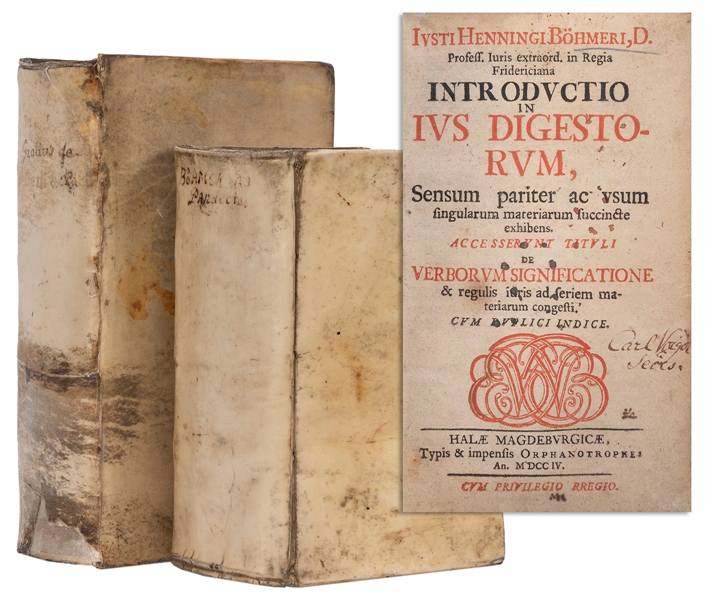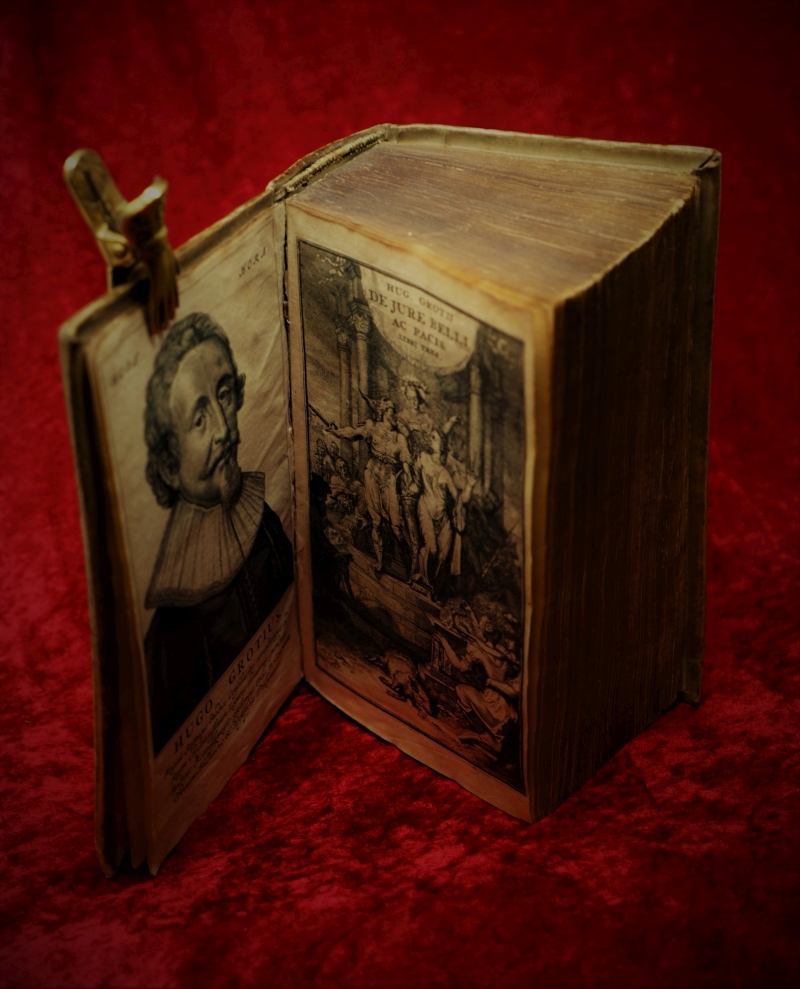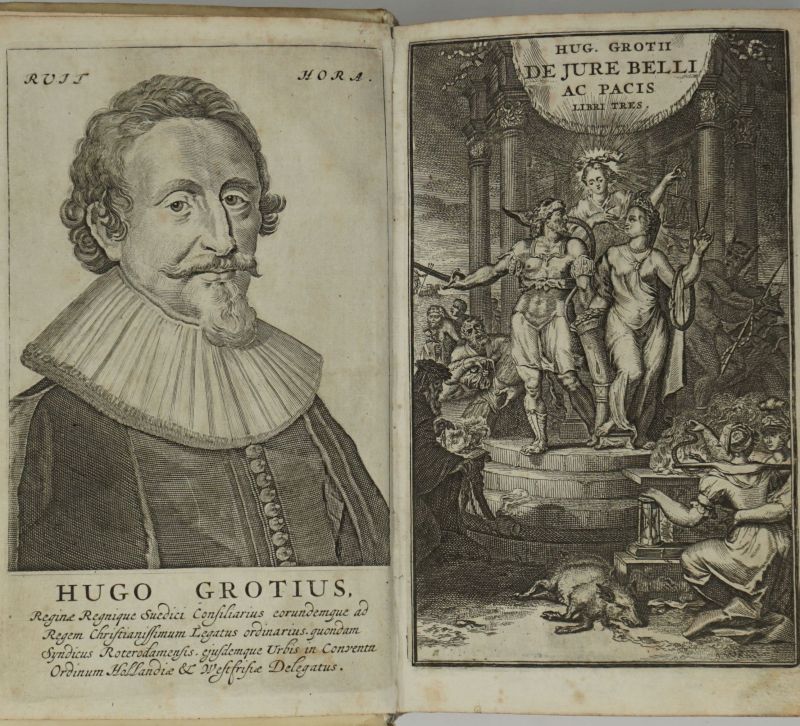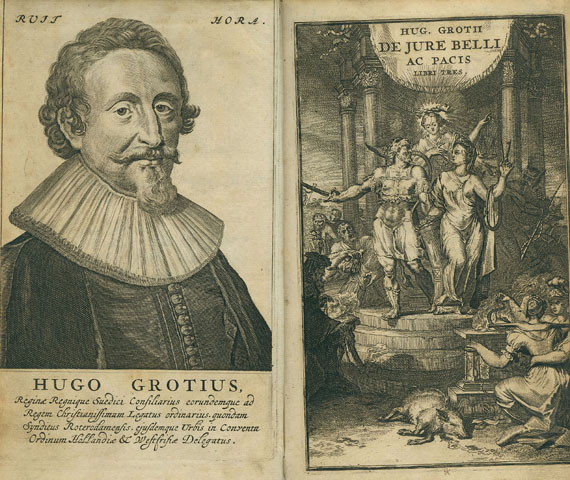GROTIUS, HUGO (1583-1645). De jure belli ac pacis libri tres. In quibus ius naturae & Gentium: item iuris publici praecupua explicantur . Paris: Nicolas Buon, 1625. 4° (246 x 180 mm). Collation: ã 6 4 4 4 A-Z 2A-2Z 3A-3S 4 4A-4Z 5A-5Q 4 (ã1r title, verso blank, ã2r author's dedication to Louis XIII, ã4r privilege dated 17 March 1625, verso blank, ã5r Prolegomena, 2r contents, 4 blank, A1r Book I, Q1r Book II, 3S4 blank, 4A1r Book III, 5G2r index of sources, 5H2v subject index, 5Q2r Addenda, 5Q4r-v Errata). 430 leaves, A1r-5G1v paginated 1-786 (with errors). Title printed in red and black, roman and italic type, a few words or phrases in Greek type, shoulder notes. Woodcut printer's device on title, woodcut head and tail-pieces and floriated initials. (Faint small dampstain to upper margins, occasional light spotting, 1 or 2 small marginal tears). Seventeenth-century French calf, sides panelled with double gilt fillet, spine similarly panelled in six compartments, the second lettered in gilt, the remainder sparsely decorated in gilt, edges red-sprinkled, many deckle edges preserved at lower edge (discreet restoration to corners and head and tail of spine, lower free endpaper torn along gutter). Provenance : 18th-century purchase note on upper pastedown: "j'ai achetté hugonis grotii de jure belli 2 l 11 payé ce mercredy 28 janvier a la 5 e et derniere vacation du [Sr?] Morelli"; Jean-François-Bonnaventure Teillard Majerolles, 18th-century ownership inscriptions on front flyleaf and title. FIRST EDITION, third state, incorporating the authorial corrections enumerated by Ter Meulen and Diermanse. A prodigy in his youth, Grotius became a statesman and thinker of the greatest integrity whose influence on modern European thought can scarcely be overestimated. In 1619, cutting short a successful career in the law and diplomacy, Grotius was sentenced to life imprisonment in the Louvestein fortress in Holland by order of the stadtholder, Prince Maurice of Nassau, for having attempted to orchestrate a compromise between the Calvinist and anti-Spanish party, led by Maurice, and the more moderate Remonstrant party, who advocated self-government of the Dutch states in matters of religion. After a dramatic escape two years later -- his wife smuggled him out of jail in a book trunk -- Grotius took refuge in France, where he survived on meager pensions, settling in 1623 in the country house of the Président de Même near Senlis, close to the property of de Thou fils , who gave him free access to his father's splendid library. There Grotius began writing his master work, De jure belli ac pacis . Many of the ideas developed therein had been outlined in an unpublished work of his youth, the De jure praedae , the manuscript of which he had brought with him, enabling him to finish the treatise in under a year. The fundamental importance of the mature work is its attempt, a century before the spread of the Enlightment, "to obtain a principle of right, and a basis for society and government, outside the church or the Bible" (Mark Pattison art. "Grotius", Ency. Brit . 1911, 12, p. 623). "The distinction between religion and morality is not clearly made, but Grotius's principle of an immutable law, which God can no more alter than a mathematical axiom, was the first expression of the 'droit naturel', the natural law which exercised the great political theorists of the eighteenth century, and is the foundation of modern international law" (PMM). Buon commenced printing the work in November 1624. By using two or three presses, a few copies, presumably of the first state (Ter Meulen and Diermanse 565 I ), were ready to be sent to the Frankfurt fair in March 1625. This first state (of which Ter Meulen and Diermanse record only one copy, at the Bodleian), contains no table, indices, addenda or errata; all but the errata were added, constituting a second state (Ter Meulen and Diermanse 565 I I ), copies of which are also extremely rare, as it appears no
GROTIUS, HUGO (1583-1645). De jure belli ac pacis libri tres. In quibus ius naturae & Gentium: item iuris publici praecupua explicantur . Paris: Nicolas Buon, 1625. 4° (246 x 180 mm). Collation: ã 6 4 4 4 A-Z 2A-2Z 3A-3S 4 4A-4Z 5A-5Q 4 (ã1r title, verso blank, ã2r author's dedication to Louis XIII, ã4r privilege dated 17 March 1625, verso blank, ã5r Prolegomena, 2r contents, 4 blank, A1r Book I, Q1r Book II, 3S4 blank, 4A1r Book III, 5G2r index of sources, 5H2v subject index, 5Q2r Addenda, 5Q4r-v Errata). 430 leaves, A1r-5G1v paginated 1-786 (with errors). Title printed in red and black, roman and italic type, a few words or phrases in Greek type, shoulder notes. Woodcut printer's device on title, woodcut head and tail-pieces and floriated initials. (Faint small dampstain to upper margins, occasional light spotting, 1 or 2 small marginal tears). Seventeenth-century French calf, sides panelled with double gilt fillet, spine similarly panelled in six compartments, the second lettered in gilt, the remainder sparsely decorated in gilt, edges red-sprinkled, many deckle edges preserved at lower edge (discreet restoration to corners and head and tail of spine, lower free endpaper torn along gutter). Provenance : 18th-century purchase note on upper pastedown: "j'ai achetté hugonis grotii de jure belli 2 l 11 payé ce mercredy 28 janvier a la 5 e et derniere vacation du [Sr?] Morelli"; Jean-François-Bonnaventure Teillard Majerolles, 18th-century ownership inscriptions on front flyleaf and title. FIRST EDITION, third state, incorporating the authorial corrections enumerated by Ter Meulen and Diermanse. A prodigy in his youth, Grotius became a statesman and thinker of the greatest integrity whose influence on modern European thought can scarcely be overestimated. In 1619, cutting short a successful career in the law and diplomacy, Grotius was sentenced to life imprisonment in the Louvestein fortress in Holland by order of the stadtholder, Prince Maurice of Nassau, for having attempted to orchestrate a compromise between the Calvinist and anti-Spanish party, led by Maurice, and the more moderate Remonstrant party, who advocated self-government of the Dutch states in matters of religion. After a dramatic escape two years later -- his wife smuggled him out of jail in a book trunk -- Grotius took refuge in France, where he survived on meager pensions, settling in 1623 in the country house of the Président de Même near Senlis, close to the property of de Thou fils , who gave him free access to his father's splendid library. There Grotius began writing his master work, De jure belli ac pacis . Many of the ideas developed therein had been outlined in an unpublished work of his youth, the De jure praedae , the manuscript of which he had brought with him, enabling him to finish the treatise in under a year. The fundamental importance of the mature work is its attempt, a century before the spread of the Enlightment, "to obtain a principle of right, and a basis for society and government, outside the church or the Bible" (Mark Pattison art. "Grotius", Ency. Brit . 1911, 12, p. 623). "The distinction between religion and morality is not clearly made, but Grotius's principle of an immutable law, which God can no more alter than a mathematical axiom, was the first expression of the 'droit naturel', the natural law which exercised the great political theorists of the eighteenth century, and is the foundation of modern international law" (PMM). Buon commenced printing the work in November 1624. By using two or three presses, a few copies, presumably of the first state (Ter Meulen and Diermanse 565 I ), were ready to be sent to the Frankfurt fair in March 1625. This first state (of which Ter Meulen and Diermanse record only one copy, at the Bodleian), contains no table, indices, addenda or errata; all but the errata were added, constituting a second state (Ter Meulen and Diermanse 565 I I ), copies of which are also extremely rare, as it appears no













Testen Sie LotSearch und seine Premium-Features 7 Tage - ohne Kosten!
Lassen Sie sich automatisch über neue Objekte in kommenden Auktionen benachrichtigen.
Suchauftrag anlegen